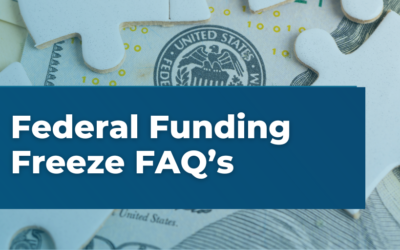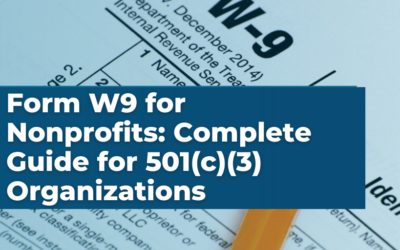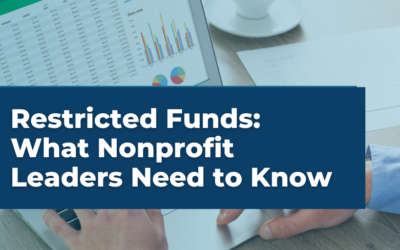Establishing and maintaining the financial integrity of a nonprofit organization is no easy task, especially if you find yourself in a period of rapid financial growth. As you raise more money, your budgets shift. As your budgets shift, reporting becomes more complicated. And if you’re a CEO or Executive Director, you likely have 2 groups that keep a vigilant eye on your organization’s financials– the Board of Directors and the IRS. Bringing a Certified Public Accountant onto your team is a strategic decision to keep things in order, but also to take a load off of your plate.
Nonprofits are mission-driven organizations run by inspired individuals. Nonprofit leaders come from all different backgrounds, some with previous financial experience and others with very little. It’s possible to prepare a nonprofit financial statement internally, however, hiring a certified public accountant can simplify the process. When you trust an expert, you can focus on what you do best, developing programs that impact your community. Here are some other ways that a financial professional can make your administrative life easier.
How Can Nonprofit Accountants Help You?
At Velu, we bring profit-focused accounting to the nonprofit industry. We establish budgets, streamline cash flows, and ensure your staff is being paid on time. We work together with leaders to build out projections, so you can fundraise with confidence. (We call it “asking for the right amount at the right time.”) Some other benefits of a nonprofit CPA are:
- Filing Form 990. This form is an annual requirement to prove to the IRS that your organization is exempted from tax. CPAs will know the proper information needed to fill out this form (and other necessary tax documents).
- Keeping your books balanced and up to date. An accountant monitors the influx to and exit of money from your organization. They ensure that both the debit and the credit check out, so you’re never caught off guard with a financial headache.
- Implementing GAAP standards. The generally accepted accounting principles are a set of guidelines for maintaining the transparency and integrity of a nonprofit financial statement. Accountants are adept at implementing these standards.
Accountants don’t just crunch numbers. They assist your nonprofit organization in preparing a wide range of documents and analyses and are fundamental to financial growth and understanding. Aside from the above-mentioned responsibilities, there is still a lot more a nonprofit CPA can do. When you work with a nonprofit accounting firm like Velu, you can handpick which services you would like to integrate with your organization.
Understanding 990 Filing Requirements
Form 990 is the standard tax form for nonprofits. It’s the IRS’s method to validate whether your nonprofit is legitimate. Failing to submit a Form 990 may cause daily penalties or even potential lawsuits. (You don’t want that, trust me.)
There are several types of Form 990, and the one you are required to submit depends on the size of your organization.
- 990N (e-Postcard) – gross receipts normally less than $50,000
- 990EZ – gross receipts less than $200,000, and total assets less than $500,000
- 990 (Full) – gross receipts are over $200,000, or total assets greater than $500K
- 990-PF – all private foundations are required to submit this form
The Form 990 filing requirements vary. For the e-Postcard, the filling-up is to be done electronically; hence, no hard copy submission is needed.
The other types of 990 are given as PDFs and can be submitted electronically. They are longer and require much more information.
990EZ requires the analysis of net assets, a balance sheet, a statement of program service accomplishments, and a list of officers. 990-PF asks for the same information as 990-EZ and also includes capital gains and losses, statements regarding activities, and minimum investment return, among others.
As for the Full form 990, it also has overlapping requirements with 990-EZ. Additionally, it asks for the statement of functional expenses and the statement of revenue.
It’s overwhelming, we know. That’s why our Velu accountants undergo training each year to ensure they are up to date with modifications to reporting season. If you need help preparing your forms, let’s get started so you can sleep easy in April.
Preparing a Statement of Functional Expenses
To fully accomplish a Form 990, you need a filled-out Statement of Functional Expenses. You’ll find this on page 10 of the form, and it asks you to provide the breakdown of your expenses according to three functions: program service, management and general, and fundraising.
The preparation of this statement can be complex. The nature of the expenses – grants, compensations, royalties, etc. – are already indicated in the form. You will need to do the accounting work in order to input the total expense per category and dissect it based on its function.
It is still more advisable to seek the help of an accountant in accomplishing this statement. Doing so ensures that the information submitted to the IRS is reliable, freeing you from possible legal repercussions.
Tracking Grant Expenditures
Grants are the backing of many nonprofit organizations. However, each has its own unique demands when it comes to financial reporting. Staying on top of these is fundamental to maintaining a strong financial foundation.
Monitoring the outflow of grants from your nonprofit is a pivotal task because the expenditure details are required in completing the 990. You will be asked about your grant expenditure in the balance sheet, statement of functional expenses, and most importantly in the statement of program service accomplishments.
One important thing to keep in mind is to always have a memorandum of understanding that is signed by your representative and the recipient. This will not only ensure that you are covering all your reporting bases, it will also make it more likely to receive said grant again in the future. As you know, nonprofit funding is a relationship and a nonprofit CPA can keep things tidy on your end.
Managing a Chart of Accounts
You may consider the chart of accounts as the master list of all financial transactions that your nonprofit makes. All the assets, liabilities, shareholders’ equity, expenditures, and revenue of your organization are tabulated in this document.
The chart of accounts is just an index of the nonprofit’s general ledger. If you have a well-detailed ledger, preparing this chart should be an easy task.
Luckily, you can depend on nonprofit CPAs to manage your ledgers for you. They are experienced in organizing financial transactions and recording them into columns appropriately. With their services, managing your nonprofit’s chart of accounts is no issue.
Conclusion
The benefit of an efficient financial documentation system to all nonprofits is substantial. With well-prepared ledgers and accounts, filing form 990 or other federal requirements becomes more convenient. And this is achievable through the help of a nonprofit accountant.
At Velu Accounting and CFO Services, we help nonprofits like yours with a variety of tasks. We assist in bookkeeping, tax filing, and even software selection. Tell us what your nonprofit needs and we will provide you with simple solutions.





